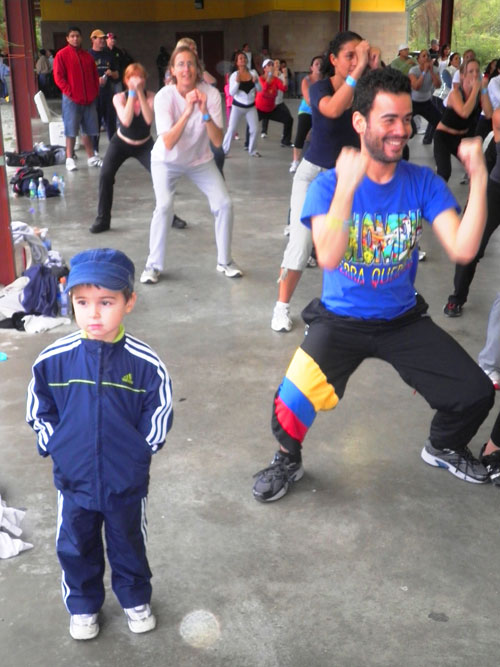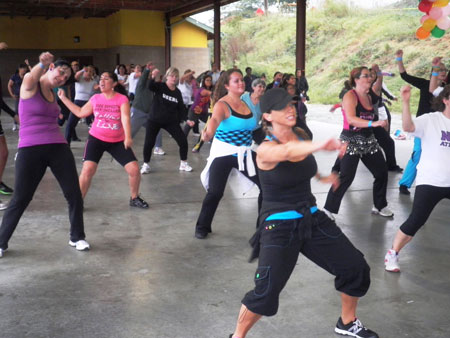By Kaylee Baker
UNC Latino Beat Writer
the Durham VOICE
thedurhamvoice@gmail.com
Despite the rain droplets that dribbled down his nose, Certified Zumba Instructor Danny Ochoa shook his hips to reggaeton music, bent backwards and smiled throughout his work-out-in-disguise.

Zumba Instructor Danny Ochoa, health specialist at El Centro, enjoys showing off his Colombian origins, which he shares with the founder of Zumba, Alberto “Beto” Perez, which he expresses through his natural Zumba dance moves. (Staff photo by Kaylee Baker)
Ochoa and more than 200 others ignored the dreary weather as they celebrated health and Latino culture at El Centro Hispano’s second ever Zumbathon, a fitness party held at the Pavilion at Durham Central Park’s Pavilion from 4:30-7 p.m. Saturday, Sept. 17
“For me, Zumba is called ‘Ruma Areóbico,” said Ochoa, who has been teaching the spicy, aerobic-filled exercise for about five years.
Ochoa said part of his passion for the Latin-inspired dance experience comes from his “vinculos” or “connections” with its birthplace of Colombia. Determined to change the mind of American hamburger lovers and exercise haters, Colombian native Ochoa carried his love for Zumba to the United States. On recommendation of his Durham Latino friends, Ochoa sought at job at El Centro Hispano.
“Me sirvió desde que llegué,” (“It has helped me since I arrived here,”) said Ochoa, now the “Especialista de Salud” or “Health Specialist” at El Centro Hispano. “El Centro fue el primer lugar dónde fui para acostumbrarme… ahora, es mi casa.” (El Centro was the first place I went in order to become accustomed [to life here] … now, it´s my home.”)
But Ochoa is not the only Colombian turned Bull Citian that has taken advantage of El Centro´s Latino-driven services. Blanca Aranzazu is a member of the Center´s Nutrition Program PESA (“Promoviendo Estado Saludable,” or “Promoting Healthy State”), a 20-session program that allows participants to discuss and receive information on nutritious eating habits, forming healthy lifestyles and exercising regularly.
Ochoa, along with Francisco Duque, development and human resources director at El Centro Hispano, and Pilar Rocha-Goldberg, president and CEO of El Centro, all agree that obesity and diabetes are two of the biggest health issues facing Latinos today. Zumba, physical exercise in the form of a non-threatening, social dance party, is their strategy for a step toward avoiding these issues.
When Aranzazu first arrived to the PESA group, she weighed 200 pounds. She was living in an environment without her mother´s healthy salads and vegetables readily available.
“I was really sad [at the time] … but apart from that … I was able to begin with changing my eating and exercise habits,” said Aranzazu, who uses her natural Colombian rhythm as an exercise advantage. “I danced Zumba and replaced rice and bread with vegetables and lost 30 pounds … and I didn’t even have to go to the gym.”
A Colombian native also, Duque said Aranzazu’s situation is not uncommon.
“That’s what El Centro is here for. We are able to help Latinos orient themselves, find medical clinics and doctors and receive affordable care.” Health is one of the four main connected programs El Centro offers, in addition to education, culture and services, and community organization. There are 38 services within the four areas, each with its own director and working team.

Durham residents get in shape as they dance Zumba to Jennifer Lopez’s “Ven a Bailar” at El Centro Hispano’s second ever Zumbathon. (Staff photo by Kaylee Baker)
“Many people do not have access to health insurance. When they come to this country they have to receive mandatory health insurance. Because they are immigrants, they do not have Medicare … a major part of the American culture,” said Duque, who moved with this family four years ago to earn his masters-degree in international development from Duke University.
Zumba offers hope for many of the Latinos Duque works with. “It’s just so healthy,” he said. “Yesterday, I sold a ticket to a person who lost 70 pounds in six months doing Zumba … it’s recreation, it’s entertainment, it’s fiesta and música Latina.”
Valine Zeigler, one of the event´s six Zumba instructors and a seven-year Durham resident, took a break to play in the rain with her two children. Managing to talk over Don Omar´s intense “Uno, Dos, Tres, Cuatro- Conteo” blaring from the speakers, she explained the often over-looked diversity associated with Zumba.
“At one of my venues … we´ll get Indian people, white people, black, African Americans, Latinos, Asians – we get a wonderful mix of people. As a Zumba instructor, we´re supposed to provide a nice mix in addition to Latino-based music.”
Durham resident Donna Burnette, an N.C. Central student majoring in African-American studies, bought two tickets (despite only using one) from the English as a Second Language teacher at the elementary school where she works.
“I’m in my fifties,” she said. “When I’m at home, Zumba is boring. I don’t want to do it, but this is great. If they had one every week, I’d pay ten dollars each time.” Burnette could barely stop dancing as the music bumped in the background.
Age diversity is just as important, as indicated by the jumping children that speckled the concrete, rain-stained dance floor. While some clung to their father’s pants and others giggled on their mother’s sore shoulders, 7-year-old Isabella Haffman ran her tiny forefingers up and down the rope that blocks off the exercise area.
“I have never danced like this before. I heard music like this at a place like this but there was food. It was to celebrate the independence day of Colombia,” said Isabella. “Zumba is really cool because you get to do lots of cool moves. You make your elbows go like this and you shake them a little, it’s easy.”
El Centro Hispano plans to have at least two yearly Zumbathons in order to make money to cover state and federal budget cuts and maintain initiatives like the Family Education program, said Rocha-Goldberg.